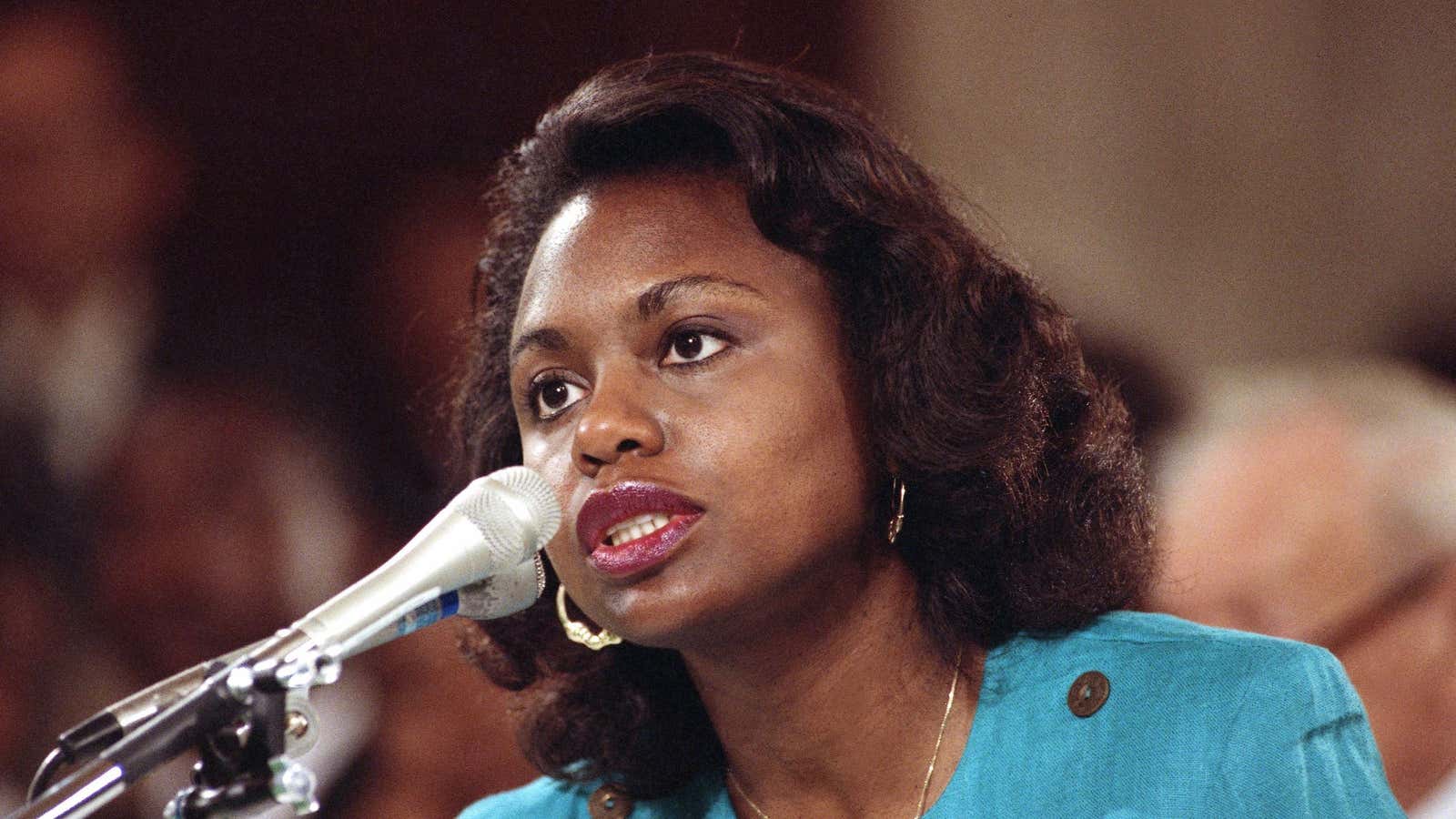In 1975, a payroll clerk at the US Environmental Protection Agency named Paulette Barnes sued the agency when she was fired for refusing a boss’s advances. A year later, a former US Justice Department employee named Diane Williams filed a claim against her ex-employers for the same reason. They won their cases, paving the way for the Supreme Court’s unanimous 1986 decision that sexual harassment was a violation of the Civil Rights Act—the result of a case brought by a third black woman, Mechelle Vinson, against the bank where her former supervisor harassed and raped her repeatedly over several years.
Five years later, law professor Anita Hill’s testimony about Clarence Thomas’s lewd behavior as her boss brought the term “sexual harassment” into public discourse and gave millions of women the ability to name the abuse they had endured.
And in the wake of the initial accusations against Hollywood producer Harvey Weinstein, the hashtag #MeToo—the name of a movement launched 10 years earlier by writer and activist Tarana Burke, also a black woman—helped to harness collective outrage into a force that is reshaping workplaces around the country.
Those notable efforts are on top of the work of civil rights activists from the members of Working Women United, an advocacy group that spoke out against harassment in the 1970s, to the activists of Black Lives Matter, who highlighted the structural oppression and aggressions large and small underpinning the discussion on harassment today.
This moment is the result of the collective labor of women of color who turned private agonies into public battles on behalf of justice. As overdue and welcome as this reckoning feels, there’s also the unsettling reality that a movement built largely on the labor of women of color has been co-opted by a discussion that prioritizes the experiences of victims who are white, wealthy, and privileged over those who are not.
Racism and sexism are inextricably intertwined. Navigating a biased system exacts a toll, from lost career opportunities to the energy expended on internal calculations for dealing with inappropriate behavior and self-doubt. Many writers, activists, and scholars have worked tirelessly to highlight the cumulative impact of these experiences in the context of race and gender alike.
But the justified outrage around sexual harassment has eclipsed the discussion on race while borrowing its language. It’s as if America can only care about one injustice at a time, and—once again—white people come first.
“I don’t want to stand overly simplistic, but this is how this country works,” said Rebecca Carroll, a WYNC public radio editor and former journalist on the Charlie Rose show, in a recent interview. “When it involves white people is when it matters.”
The recent scrutiny of sexual misconduct in media, entertainment, tech, and other highly visible industries is justified. Women of color are among the Oscar-winning actors, lawmakers, and tech founders who have come forward with their experiences of harassment and abuse. In fact, women of color are more likely to be targets of sexual harassment than white women, according to a 2016 report from the US Equal Employment Opportunity Commission.
In the last decade, according to an analysis of EEOC data by the Center for American Progress, the industries with the greatest number of sexual harassment claims include hotel and food services, retail, and and health services—all areas where women of color are overrepresented. In 2016, organizers representing hospitality workers in Chicago started an anti-harassment campaign called “Hands Off Pants On” after a survey found that 58% of hotel workers and 77% of casino workers had been sexually harassed by a guest.
“If wealthy, highly visible women in news and entertainment are sexually harassed, assaulted and raped—what do we think is happening to women in retail, food service and domestic work?” wrote Charlene Carruthers, an activist and founder of Black Youth Project 100, on Twitter.
It’s not fair, nor is it even possible, to separate gender from race and class and say, “We’ll get to those later—but first let’s settle this.” Women of color fought the battles that brought society to this point, where even the faint hope of change seems possible. To use that work without ensuring that this broken system is replaced with one inclusive of race, in addition to gender, is not partial victory. It’s complete failure. The US has a long and sordid history of taking the labor of people of color for granted. In this great shakeup, it’s time to put an end to that, too.
